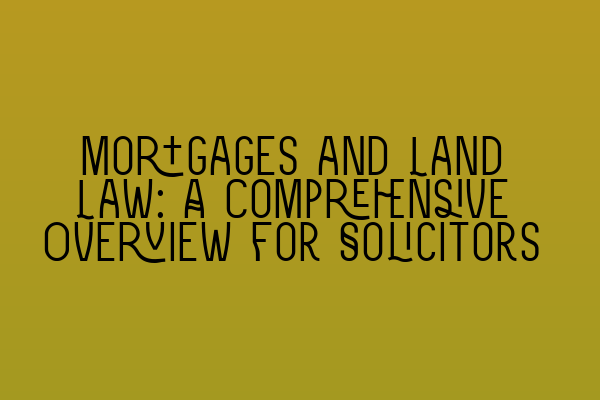Mortgages and Land Law: A Comprehensive Overview for Solicitors
Introduction:
As a solicitor specializing in property law, it’s essential to have a comprehensive understanding of mortgages and land law. Whether you’re preparing for the SQE 1 or SQE 2 exams, or simply brushing up on your knowledge, this blog post aims to provide you with a detailed overview of mortgages and land law. We’ll cover everything from the basics of mortgages to the intricacies of land registration, equipping you with the knowledge you need to excel in your practice. Let’s dive in!
Table of Contents:
1. Introduction to Mortgages
2. Types of Mortgages
3. Secured Loans and Lenders’ Rights
4. Land Registration and Mortgages
5. Priority of Mortgages
6. Enforcement of Mortgages
7. Foreclosure and Repossession
8. Professional Responsibilities and Code of Conduct
9. Conclusion
1. Introduction to Mortgages:
A mortgage is a legal instrument that allows a borrower to secure a loan using their property as collateral. It’s important for solicitors to understand the key elements of a mortgage, including the parties involved (borrower, lender), the property in question, and the terms and conditions of the loan. It’s worth noting that mortgages are governed by both common law and legislation, which we’ll explore later in this post.
2. Types of Mortgages:
There are several types of mortgages that solicitors need to be familiar with. These include fixed-rate mortgages, variable-rate mortgages, interest-only mortgages, and buy-to-let mortgages. Each type has its own set of characteristics and legal implications, so it’s crucial to understand the nuances associated with each.
3. Secured Loans and Lenders’ Rights:
Mortgages are a form of secured loans, meaning that the lender has a legal claim on the property until the loan is repaid in full. Solicitors must be well-versed in lenders’ rights, including their ability to exercise various legal remedies in the event of default. These rights may include the right to foreclose, repossess, or obtain an order for sale.
4. Land Registration and Mortgages:
Land registration plays a pivotal role in the mortgage process. Solicitors must be familiar with the laws and procedures governing land registration, as well as the role of the Land Registry and the significance of the Registered Title. Understanding the impact of land registration on mortgages is paramount.
5. Priority of Mortgages:
In situations where multiple mortgages exist on the same property, solicitors must be able to determine their priority. The concept of priority determines the order in which mortgages are satisfied in the event of foreclosure or sale. An in-depth understanding of priority rules is indispensable for solicitors dealing with complex mortgage transactions.
6. Enforcement of Mortgages:
When a borrower defaults on their mortgage, the lender has the right to enforce the mortgage through various legal means. Solicitors must be well-versed in the enforcement process, including the issuance of legal notices, seeking possession orders, and conducting foreclosure proceedings. Proper handling of mortgage enforcement ensures a fair and lawful process for all parties involved.
7. Foreclosure and Repossession:
Foreclosure and repossession are potential outcomes of mortgage default. These processes involve the termination of the borrower’s rights to the property and the eventual transfer of ownership to the lender. Solicitors must understand the legal intricacies surrounding foreclosure and repossession, including their impact on the borrower’s rights and obligations.
8. Professional Responsibilities and Code of Conduct:
As solicitors, we have a duty to act in the best interests of our clients and uphold the highest professional standards. This includes adhering to the Solicitors Regulation Authority’s Code of Conduct, which provides guidelines on professional responsibilities in the context of mortgages and land law. Understanding and applying these ethical principles is crucial for solicitors practicing in this area.
9. Conclusion:
Mortgages and land law are complex areas of practice that require a deep understanding of legal principles, procedures, and ethical considerations. By familiarizing yourself with the basics of mortgages, types of mortgages, lenders’ rights, land registration, priority, enforcement, and professional responsibilities, you’ll be well-equipped to navigate the intricate world of property law. Remember to continue your professional development by exploring our related articles on SQE exam preparation, practice exams, and courses.
Related Articles:
– SQE 1 Practice Exam Questions
– SQE 1 Practice Mocks FLK1 FLK2
– SQE 2 Preparation Courses
– SQE 1 Preparation Courses
– SRA SQE Exam Dates
We hope this comprehensive overview has provided you with valuable insights into mortgages and land law. Should you have any further questions or require legal assistance, our expert team at SQE Property Law & Land Law is here to help.
